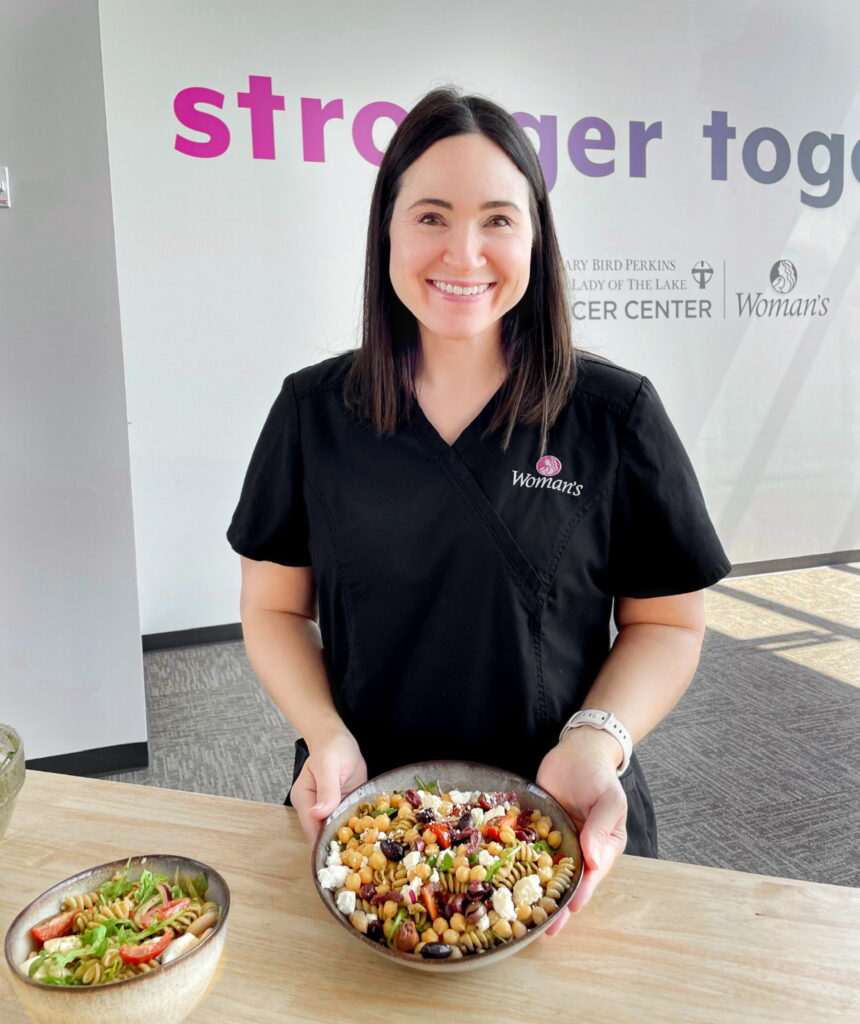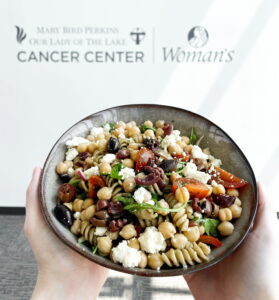By: Robin Strate, RDN, LDN

Women have unique needs when it comes to health and wellness! There are certain types of cancers that only women can be afflicted with and these include all gynecological cancers such as uterine, endometrial, ovarian, vaginal, vulvar, and cervical. There is sufficient evidence from research to suggest that excess body fat can increase risk for some cancers including endometrial and ovarian and limited evidence to suggest the same for cervical cancer. This makes living a healthy lifestyle all the more important for women to help control their individual risk for certain GYN related cancers.
Nutrition and physical activity play a very important role in our overall health including cancer prevention. According to the American Cancer Society (ACS), the five most common types of new cancer cases in the United States for women are Breast, Lung, Colorectal, Uterine, and Thyroid. Cancer is the second most common cause of death in the US and 38% of women in the US will develop cancer at some point during their lifetime. A healthy lifestyle which includes recommendations for nutrition and physical activity can promote overall health, reduce body fat percentage, and prevent nutrition related chronic disease and certain types of cancer.
Research suggests that nutrition can play a protective role in all stages of cancer. Individual food components may promote detoxification of cancer causing agents, prevent DNA damage, induce death of cancerous cells, and may support DNA repair, hormone regulation, and anti-inflammatory responses.
The World Cancer Research Fund (WCRF) and The American Institute for Cancer Research (AICR), the American Cancer Society (ACS), and the American College of Sports Medicine have compiled recommendations for nutrition and/or physical activity aimed at cancer prevention. These guidelines all parallel those of the 2020-2025 Dietary Guidelines for Americans.
Guidelines for a Healthy Lifestyle to prevent Cancer and Chronic Disease:
- Be a healthy weight – Aim for a Body Mass Index (BMI) of 18.5 – 24.9 or if greater than 65 years of age a BMI of 25-27.
- Be physically active – Adults should engage in 150-300 minutes of moderate intensity physical activity per week (less of engaging in vigorous intensity activity) AND strength training at least 2 d/week; 8-12 repetitions, 1-3 sets.
 Eat a diet rich in whole grains, vegetables, fruit, and beans – In general we do not eat enough lentils, beans, legumes and leafy greens, make these foods and all listed in this recommendation part of your daily diet. These food sources will help with reach a goal of 30g fiber/day. Focus on a variety of at least 5 portions/servings every day.
Eat a diet rich in whole grains, vegetables, fruit, and beans – In general we do not eat enough lentils, beans, legumes and leafy greens, make these foods and all listed in this recommendation part of your daily diet. These food sources will help with reach a goal of 30g fiber/day. Focus on a variety of at least 5 portions/servings every day.- Limit consumption of fast foods and other processed foods high in fat, starches, or sugars – limiting these foods helps control overall energy intake and thus weight. These include fast foods, bakery foods, prepared foods such as pastries and muffins, premade store bought casseroles and dishes, desserts, and candies
- Limit consumption of red and processed meat – if red meat is consumed (beef, pork, lamb) limit to no more than 3 portions (12-18 ounces total per week) of red meat and very little if any processed meat (bacon, sausage, cured deli meats, etc)
- Limit consumption of sugar sweetened drinks – drink mostly water and unsweetened drinks. Sugar sweetened beverages can lead to excess energy intake and potential weight gain.
- Limit alcohol consumption – for cancer prevention it is best not to drink alcohol. Adults who choose to drink alcohol should limit to no more than 1 drink per day for women and 2 drinks per day for men. 1 serving/drink of alcohol is equivalent to 12 ounces of regular beer, 8 ounces of malt liquor, 5 ounces of wine, OR 1.5 ounces of hard liquor) The higher the alcohol percentage the smaller the serving size.
- Do not use supplements for cancer prevention – Aim to meet nutrient needs through diet alone. Do not take high dose dietary supplements to prevent cancer.
- For mothers: breastfeed you baby, if you can – breastfeeding may help reduce a woman’s risk of certain types of breast cancer. The World Health Organization recommends infants exclusively breastfeed for 6 months and then up to 2 years of age or beyond alongside an age appropriate diet.
- After a Cancer Diagnosis follow recommendations to reduce risk of recurrence or other cancers – if you can, follow the American Institute for Cancer/World Health Organization’s recommendations. Talk to your healthcare provider about what’s best for you.
Sources:
- American Cancer Society
- World Cancer Research Fund/American Institute of Cancer Research,
- Voss, Coble Anne, and Valaree Williams. Oncology Nutrition for Clinical Practice. Academy of Nutrition and Dietetics, 2021.

